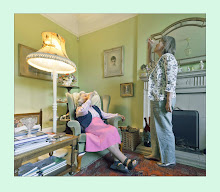I thought it would be good to know a little more about the old argument concerning the differences between photography and art, here referred to as paint; nowadays, photography is widely accepted as art yet the question hangs around the apparent mechanicality of photography and the skill involved in painting a picture. My interest is not so much in whether one is superior and the other inferior rather the differences in the two mediums and their strengths and weaknesses. It seems to me they exercise different parts of the brain and can not really be measured up against each other. Painting has been going on for thousands of years while photography is about 170 years old possibly more if one accepts the light impressions of Niepce and the Dageurotype, processes that did not however lend themselves to infinite multiplication.
As I see it, photography is much more complex than people generally understand it and the skill lies with the ability to make images according to one's vision which is what paint does in a more simple and direct way. It does seem to me rather typical of painters to consider themselves, or at least their work, superior and a reason why it took me some time to like painting. Photography is younger and not so presumptous.
Here is what the Intelligence2 website about the debate says ...
In the beginning was the challenge: how to use eye, hand and brain to represent the significance of the world to our fellow humans. There followed the sinuous cave paintings of Perigord; the rigid, sparkling mosaics of Ravenna; the stunning Renaissance discovery of perspective. And the fellow humans marvelled at the dexterity of hand and the conceptual ingenuity of eye and brain behind such visions, and glorified them as art.
But how do we feel now that the machine has interposed itself between ourselves and the world? Now that the dexterity of hand has been replaced by the finger’s click on the camera shutter? Now that the imagination of eye and brain has been confined within the rectangle of the viewfinder? If there is great art here, doesn't it lie in the creation of the camera itself rather than the pictures it takes? Is it not the genius of the scientists who devised the camera’s intricate mechanisms and powerful lenses that we should now marvel at, rather than the output of the adepts who operate the machine?
Or are we still too much in thrall to the notion of art held by our pre-industrial forbears? Shouldn't we just accept that art has been freed of its ancient constraints, and acknowledge that the finest photographers offer us an interpretation of the world quite as original as that of the great painters; that in the digital age, photography is now the medium that matters?
But how do we feel now that the machine has interposed itself between ourselves and the world? Now that the dexterity of hand has been replaced by the finger’s click on the camera shutter? Now that the imagination of eye and brain has been confined within the rectangle of the viewfinder? If there is great art here, doesn't it lie in the creation of the camera itself rather than the pictures it takes? Is it not the genius of the scientists who devised the camera’s intricate mechanisms and powerful lenses that we should now marvel at, rather than the output of the adepts who operate the machine?
Or are we still too much in thrall to the notion of art held by our pre-industrial forbears? Shouldn't we just accept that art has been freed of its ancient constraints, and acknowledge that the finest photographers offer us an interpretation of the world quite as original as that of the great painters; that in the digital age, photography is now the medium that matters?
Henri Cartier-Bresson writes in The Mind's Eye that the argument about art/paint versus photography is an academic one and I concur yet the nature of the photographic medium concerns me and seeing it outlined against that of paint might be quite helpful in developing a better understanding of this nature.

No comments:
Post a Comment